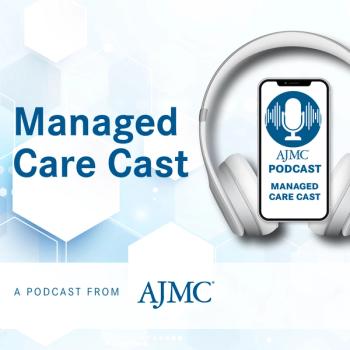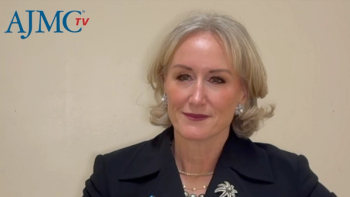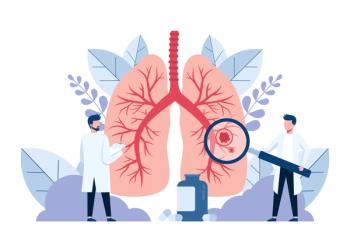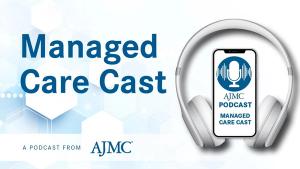
Medically integrated dispensing (MID) improves monitoring and supports value-based care, but startup costs and payer barriers remain, notes Katherine Tobon, PharmD, BCOP.

Brooke is an associate editor for The American Journal of Managed Care® (AJMC®). She joined AJMC in 2023, where she produces content covering multiple disease states.
She has a BA in journalism from Seton Hall University. You can connect with Brooke on LinkedIn.

Medically integrated dispensing (MID) improves monitoring and supports value-based care, but startup costs and payer barriers remain, notes Katherine Tobon, PharmD, BCOP.

Susan Vadaparampil, PhD, MPH, highlights disparities in cancer outcomes and trial enrollment but underscores that linking community screening programs with cancer centers may help.

Targeted therapies, bispecifics, and CAR T-cell therapies are giving patients with multiple myeloma hope for long-term remission or a potential cure.

A deep-learning serial CT response score outperformed conventional imaging measures in predicting OS for patients with advanced NSCLC treated with ICIs.

These findings suggest the mental health burden in nonmelanoma skin cancer reflects broader social and clinical factors rather than disease-specific effects.

Experts raise concerns that CDC childhood immunization changes could reduce vaccine uptake and weaken trust in public health guidance.

Nate C. Apathy, PhD, guest editor of AJMC's 15th Health IT special issue, calls for tools to be closely aligned with user needs.

Almost half of the monthly-updated CDC databases had unexplained pauses in 2025, mostly affecting vaccination data, raising transparency and public health concerns.

Experts underscored that educating clinicians and the public about red flag CRC symptoms could facilitate earlier screening, diagnosis, and treatment.

Adults who are underweight, overweight, or obese face higher medical expenditures, varying by age, sex, and care setting.

These findings support the potential role of ctDNA in prognostic assessment and early intervention.

Patients with psychiatric disorders had higher CRC risk but no increase in CRC-specific mortality.

This meta-analysis, which found no statistically significant OS differences by sex, age, or race with ICIs, highlights the need for more diverse, representative NSCLC trials.

Young adults with metastatic CRC (mCRC) and low socioeconomic status (SES) face higher 3-year mortality, whereas race was not independently linked with survival.

Patients with proinflammatory, pro-oxidative diets may face accelerated biological aging and increased skin cancer risk.

Alongside physician collaboration, patient advocacy is essential to ensure clinical trials and public policy reflect patient-centered outcomes.

Based on these findings, the investigators encourage further research into this promising combination.

Influenza surveillance is essential to accurately measure disease burden, guide policy, and strengthen preparedness for future pandemics, according to Marco del Riccio, MD.

On average, patients with multiple prior dermatology visits still scored below 75% when identifying common skin cancer terms, underscoring the need for clearer patient-physician communication.

Patient–physician collaboration ensures trials reflect outcomes that matter to patients, according to Debra Patt, MD, PhD, MBA, MPH.

Last week, OpenAI launched AI tools for health care organizations, including ChatGPT for Healthcare, designed to improve care and streamline administrative tasks.

Risk-based vaccination strategies and clinical pathway integration could improve coverage and strengthen future influenza preparedness, according to Marco del Riccio, MD.

Nursing home capacity has declined since the COVID-19 pandemic, causing greater strain on postacute care, especially in rural areas.

Yara Abdou, MD, emphasizes that addressing fertility, survivorship, and quality of life is key to improving outcomes for young patients with breast cancer.

Although influenza vaccine uptake remains low, improving access, recommendations, and trust may help close coverage gaps.

Asian women with breast cancer receiving chemotherapy had the highest persistent chemotherapy-induced alopecia (PCIA) incidence and alopecia-related distress vs their White, Black, and Hispanic or Latino peers.

Multidisciplinary care helps manage cardiac risks in breast cancer, allowing patients to continue treatment safely, says Eric H. Yang, MD.

EHR penicillin allergy flags do not often match allergist assessments, highlighting the need for improved evaluation processes.

Flu vaccination in older adults may prevent hospitalizations and cardiovascular events, saving lives and reducing health care costs, according to Marco del Riccio, MD.

Smart pill bottles may boost adherence to oral breast cancer therapies through daily reminders and tracking, though cost and technology barriers remain, says Steven Manobianco, MD.

Published: January 27th 2026 | Updated: February 3rd 2026

Published: October 21st 2024 | Updated: October 24th 2024

Published: September 26th 2025 | Updated:

Published: June 11th 2024 | Updated:

Published: September 19th 2024 | Updated:

Published: November 13th 2023 | Updated:

259 Prospect Plains Rd, Bldg H
Cranbury, NJ 08512
© 2025 MJH Life Sciences®
All rights reserved.
